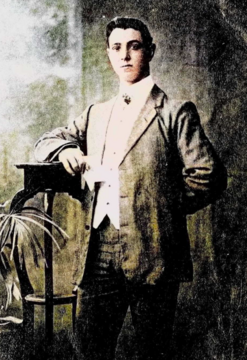
BAKER, William Robert
| Service Number: | 13 |
|---|---|
| Enlisted: | 30 September 1914 |
| Last Rank: | Private |
| Last Unit: | 13th Infantry Battalion |
| Born: | Stone Hut, South Australia, 2 July 1888 |
| Home Town: | Stone Hut, South Australia |
| Schooling: | Public School, Laura, South Australia |
| Occupation: | Sawyer |
| Died: | Killed in Action, Gallipoli, 27 August 1915, aged 27 years |
| Cemetery: |
No known grave - "Known Unto God" Lone Pine Memorial, Gallipoli |
| Memorials: | Adelaide National War Memorial, Australian War Memorial Roll of Honour, Broken Hill Railwaytown War Memorial, Laura War Memorial, Lone Pine Memorial to the Missing, Stone Hut Memorial Trees, Stone Hut Roll of Honour WW1 |
World War 1 Service
| 30 Sep 1914: | Enlisted AIF WW1, Private | |
|---|---|---|
| 22 Dec 1914: | Involvement Private, 13, 13th Infantry Battalion, ANZAC / Gallipoli, --- :embarkation_roll: roll_number: '11' embarkation_place: Melbourne embarkation_ship: HMAT Ulysses embarkation_ship_number: A38 public_note: '' | |
| 22 Dec 1914: | Embarked Private, 13, 13th Infantry Battalion, HMAT Ulysses, Melbourne | |
| 3 May 1915: | Wounded AIF WW1, Private, 13, 13th Infantry Battalion |
Help us honour William Robert Baker's service by contributing information, stories, and images so that they can be preserved for future generations.
Add my storyBiography contributed by Adelaide Botanic High School
William Robert Baker was born on the second of July 1888 in the town of Stone Hut South Australia to William Thomas and Mary Ann Baker. Stone Hut is a town about 50km northeast of Port Pirie. He went to Laura Public School and lived in Stone Hut most of his life. He was a Sawyer by trade which is an old term for a woodcutter and he identified as being Methodist.
William Robert Baker enlisted in the army on the thirtieth of September 1915 in Sydney New South Wales. His registration number was 13, coincidentally matching the battalion he was in. His unit embarked from Melbourne, Victoria on board transport a38 Ulysses on the 22 of December 1914, the ship then disembarked in Egypt. In Egypt, he trained in the desert near the pyramids of Giza about 16km away from Cairo. The soldiers trained in the extreme heat 6 days a week and on the days that they didn't train they would go into town and spend time at bazaars, brothels, and cafes. His training was mostly learning how to work together in a platoon, company or battalion and their tactics. They trained in open warfare which is fast-paced fighting on an open battlefield which wouldn't help at the battle of Gallipoli.
In March 1915 William Robert Baker departed from Egypt on his way to Gallipoli. By May 1st the small beach now known as Anzac cove had become the administrative centre where wounded and even dead men were taken for help or to be buried. A mere 2 days later William Robert Baker found himself there wounded, luckily it wasn't fatal and he returned to battle soon after. He fought in the Battle of Hill 60 which was part of the August offensive which was aimed to capture 2 peaks in the Sari Bair range. Sadly, William Robert Baker died on the 27th of August 1915 in the second attack on Hill 60 where a small amount of ground was taken, then lost, then retaken.










